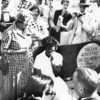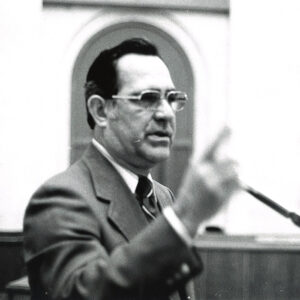calsfoundation@cals.org
Act 401 of 1951
aka: Communist Registration Act
Also called the Communist Registration Act, Act 401 was approved in March 1951 during the tenure of the Fifty-eighth Arkansas General Assembly. It was subtitled “An Act to Require Members of Certain Organizations Advocating the Unconstitutional Overthrow of the United States or of the State of Arkansas to Register With the State Police.” Ostensibly directed against members of the Communist Party USA (CPUSA) and affiliated organizations, Act 401 was passed in the context of the Second Red Scare following World War II.
Act 401 did not emerge in a political vacuum, nor was this law unprecedented in Arkansas history. Act 401 was consistent with federal, state, and local legislation against “subversive organizations.” The law joined a long line of federal legislation since the Alien and Sedition Acts (1798) that violated civil liberties and civil rights. Act 401 was passed over a year after U.S. senator Joseph McCarthy’s notorious anti-communist speech about “enemies from within” in Wheeling, West Virginia, and approximately six months after the U.S. Senate passed the Internal Security Act—both events often considered milestones in the Second Red Scare. However, Act 401 more closely resembled various state measures that had been passed since the beginning of the First Red Scare in 1919.
State Representative Jacob Andrew “Dooley” Womack of Dallas County was the lead sponsor of HB 470, which he introduced in late February 1951. It passed unanimously in both the House of Representatives (seventy-six votes; twenty-four abstentions or “not present”) and the Senate (twenty-seven votes; eight abstentions or “not present”). Act 401 was approved by Governor Sidney McMath on March 26, 1951. According to the law, members of the Communist Party and its affiliates were required to register with the Arkansas State Police within ninety days of passage of the law. Failure to do so could, upon conviction, result in a fine of $50,000 to $100,000 or a prison sentence of six months to two years. (It is arguable if the draft of Act 401 was completely thought out, as the law stated that members of the “Communist Political Association” had to register with the State Police; this organization was a wartime creation of the CPUSA leadership and had gone out of existence five years before Womack introduced HB 470.)
It does not appear that Act 401 was ever fully enforced in its fifty-two years of existence. In fact, the U.S. Supreme Court had ruled in Pennsylvania v. Nelson (1956) that state anti-subversive laws were unconstitutional. The administration of Governor Orval Faubus, however, attempted to use the measure in the late 1950s against at least one resident of Arkansas. In 1958, Attorney General Bruce Bennett announced that his office was considering if Act 401 could be invoked against Lee Lorch, an active member of the Little Rock Branch of the National Association for the Advancement of Colored People (NAACP) and a reputed communist who had not registered with the Arkansas State Police. As reported in the Arkansas Democrat, Bennett said of a probe into the matter that the Special Education Committee of the General Assembly’s Legislative Council was not authorized to issue “contempt citations like the congressional committees… All we could do under the circumstances was to get out our do-it-yourself kits and do the best we could.” Concluding that it was “a very touchy situation,” Bennett did not pursue the matter.
Act 401 belongs to a tradition of curtailing civil liberties and civil rights in Arkansas, usually based on race or religion. Act 151 of 1859 banned free black or mixed-race people from Arkansas. Act 17 of 1891 racially segregated passenger trains. Act 320 of 1911 criminalized interracial marriage. Act 130 of 1915 allowed county and local authorities to inspect Roman Catholic institutions. There was a white supremacist character to all of these measures. There are striking parallels between Act 401 and the pro-segregation measures passed by the General Assembly between 1957 and 1959. For example, Act 10 of 1958 required state employees to reveal their political affiliations (the organization in mind was the NAACP). Act 115 of 1958 stipulated that state employees could not be in the NAACP. Therefore, Act 401 was not simply an isolated Cold War law but also laid the groundwork for measures explicitly drafted in opposition to black civil rights in Arkansas.
Act 401 was repealed by Act 798 of 2003, during the Eighty-fourth General Assembly. The reason given was that Act 401 was of “dubious validity under the First Amendment to the United States Constitution,” a situation that could expose the state government to “liability for attorneys’ fees or costs” due to legal challenges. Act 798 was sponsored by Representative Jodie Mahony.
The legacy of Act 401—curtailing of rights for certain people and possible unconstitutionality that could be costly for the state in terms of legal fees—can be found in more recent controversies surrounding Act 301 of 2013 (the Human Heartbeat Protection Act) and Act 975 of 2015 (the Conscience Protection Act).
For additional information:
“Act 789 of 2003.” Arkansas General Assembly. http://www.arkleg.state.ar.us/assembly/2003/R/Acts/Act798.pdf (accessed November 12, 2020).
Acts of the Fifty-Eighth General Assembly of the State of Arkansas. Little Rock: Quapaw Printing Company, 1951.
Mayfield, R. B. “Bennett Not to Question Other Side.” Arkansas Democrat, December 19, 1958, pp. 1–2.
Prendergast, William B. “State Legislatures and Communism: The Current Scene.” American Political Science Review 44 (September 1950): 556–574.
Riva, Sarah. “Acting Up and Courting Controversy: The Arkansas General Assembly Legislative Sessions of 1957, 1958, and 1959.” MA thesis, University of Arkansas at Little Rock, 2013.
Schrecker, Ellen. Many Are the Crimes: McCarthyism in America. Boston: Little, Brown and Company, 1999.
Woods, Jeff. Black Struggle, Red Scare: Segregation and Anti-Communism. Baton Rouge: Louisiana State University Press, 2004.
Anthony B. Newkirk
Philander Smith College
 Law
Law Lorch, Grace Lonegran
Lorch, Grace Lonegran Politics and Government
Politics and Government World War II through the Faubus Era, 1941 through 1967
World War II through the Faubus Era, 1941 through 1967 Jodie Mahony
Jodie Mahony  J. A. Womack
J. A. Womack 




Comments
No comments on this entry yet.